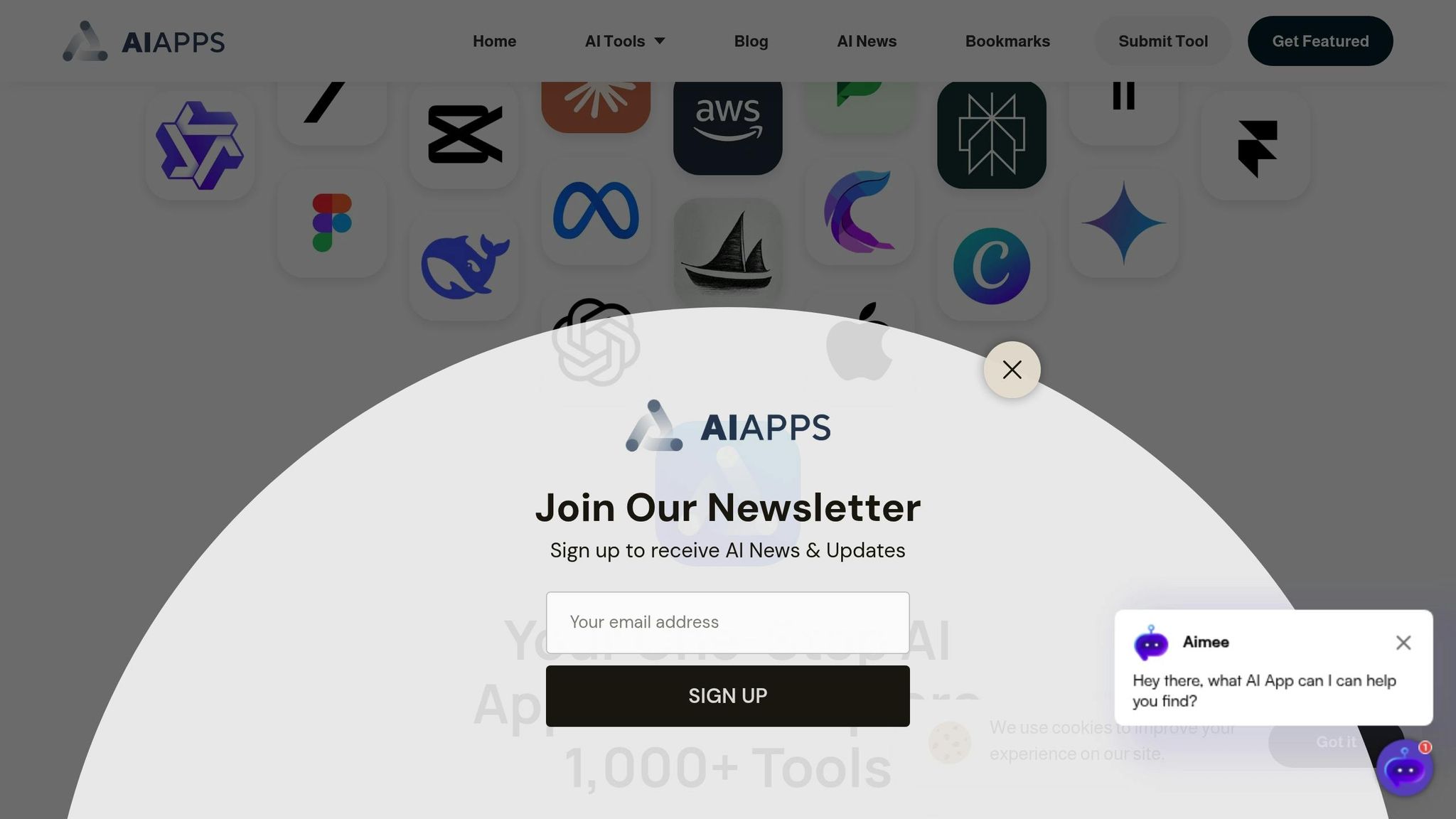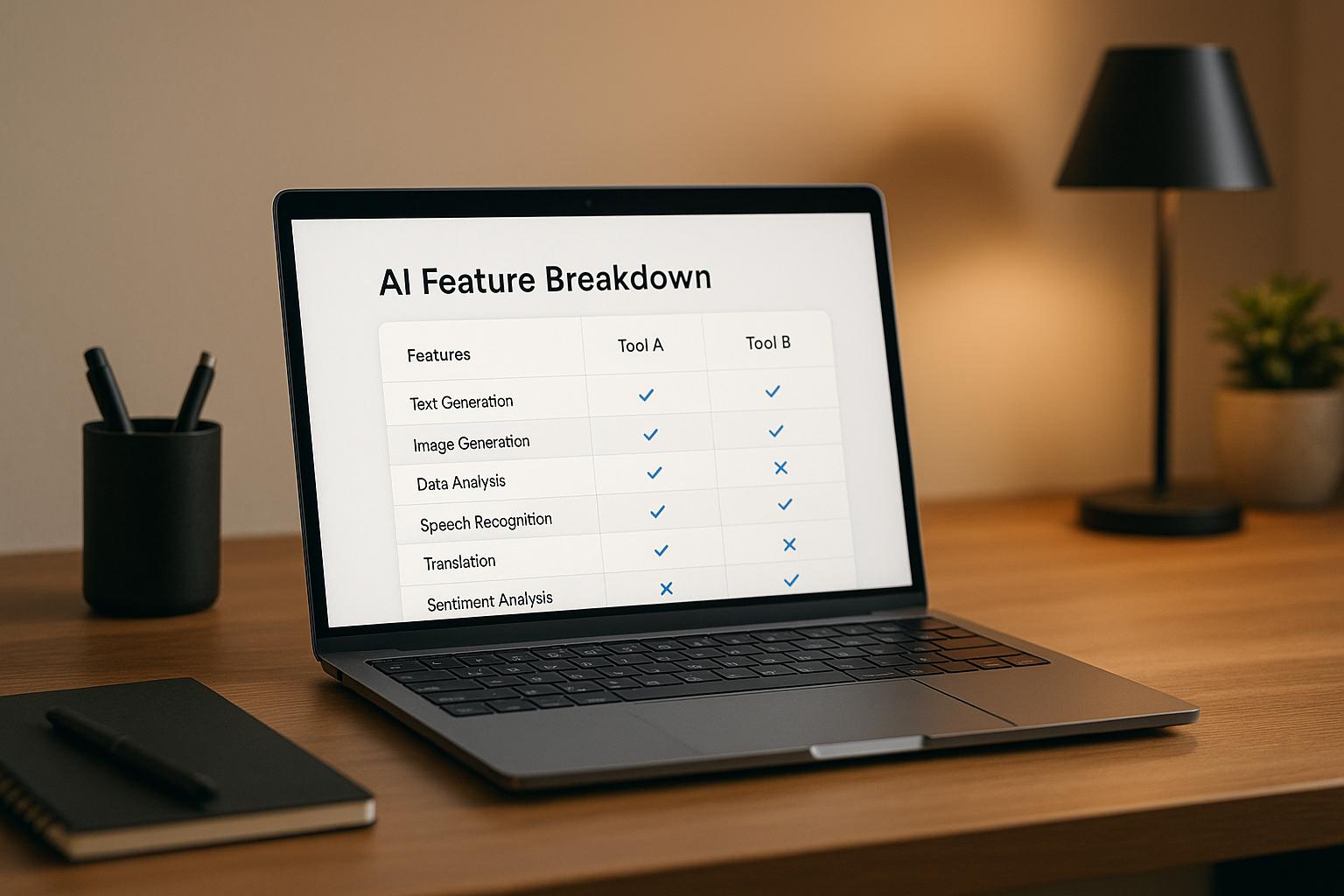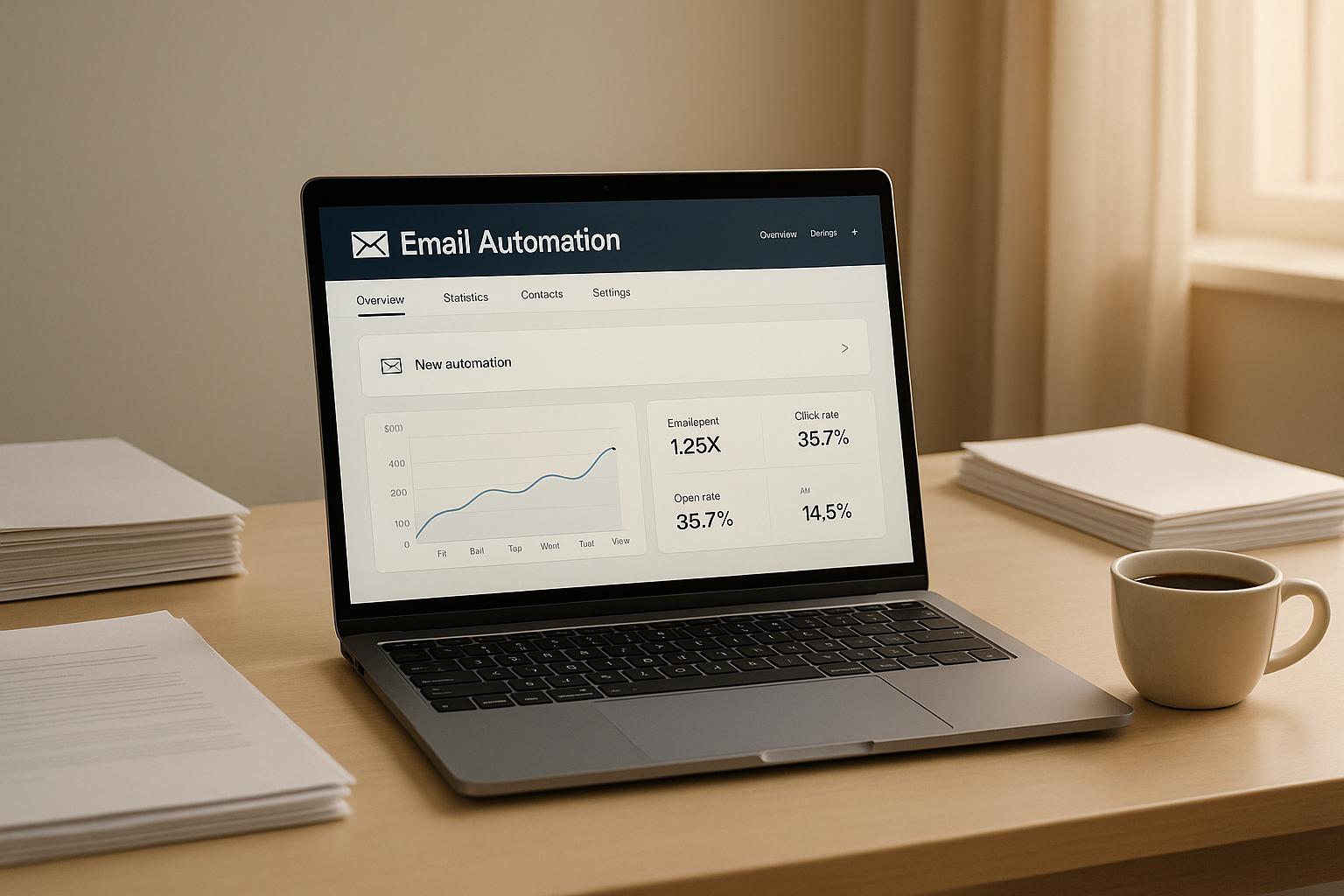AI is no longer optional in today’s workplace. By 2025, understanding how to use AI tools effectively will be as basic as knowing how to send an email. Employers are prioritizing candidates who can work with AI to boost productivity, reduce costs, and improve decision-making.
Here’s what you need to know:
- AI literacy means using AI tools, crafting clear prompts, and analyzing outputs critically - not becoming a coder.
- AI skills are now a baseline expectation across industries like marketing, finance, HR, and education.
- Key areas to focus on include understanding data, hands-on experience with tools, and ethical AI use.
- Tools like AI Apps help professionals find and compare AI solutions tailored to their needs.
The gap between those who use AI and those who don’t is growing fast. Start by learning one tool, applying it to a simple task, and building from there. Your career depends on it.
What is AI Literacy and why does it matter for your career?
Core AI Skills Every Professional Needs
To truly excel in the AI-driven world, professionals need to focus on three key skill areas. These skills form the backbone of effectively using AI tools, no matter your industry or role. Strengthening these abilities not only boosts efficiency but also helps avoid common pitfalls like project missteps or data security breaches.
Understanding AI Data and Results
One of the most important skills is the ability to critically assess AI outputs. While AI tools can deliver impressive results, they’re far from perfect. Developing a verification mindset - spotting errors, double-checking facts, and recognizing the limits of AI - will set you apart from those who blindly trust the system.
AI outputs can sometimes be confidently wrong, a phenomenon known as "hallucination." To avoid falling into this trap, always cross-check crucial information and question anything that seems off or overly optimistic.
Another key aspect is pattern recognition. AI thrives on identifying trends in massive datasets, but it’s up to you to interpret what those patterns mean for your business. For instance, if an AI tool highlights a 15% rise in customer complaints about shipping delays, you should be able to translate that insight into actionable steps, like revising logistics strategies or improving customer communication.
Equally important is understanding data quality requirements. Clean, well-structured input data leads to better AI performance. Learn how to craft clear prompts, provide relevant context, and organize information effectively. This includes being specific about your needs, setting boundaries, and offering examples to guide the AI.
Once you’ve mastered evaluating data, the next step is applying this knowledge through hands-on practice with AI tools.
Hands-On Experience with AI Tools
Prompt engineering is quickly becoming a must-have skill. This involves learning how to interact with AI systems to get the best results. Effective prompts are clear, detailed, and often include examples of the desired outcome.
Gaining experience with different AI applications is essential to becoming versatile. Text generation tools can streamline email writing or report drafting, image generators can enhance marketing efforts, and data analysis platforms can uncover trends and produce visualizations. The more tools you’re comfortable using, the more valuable you’ll be in any professional setting.
A technique called iterative refinement can help you improve output quality. Start with a basic prompt, review the results, and tweak your request. Often, by the third or fourth attempt, you’ll achieve significantly better outcomes.
Finally, learn to integrate AI tools into your workflow. This could mean using AI to draft initial versions of documents for you to refine or leveraging AI-generated insights to make informed decisions. The aim is to complement your expertise, not replace it.
Alongside technical skills, it’s vital to approach AI with an awareness of ethics and security.
AI Ethics and Security Awareness
When using AI tools, always prioritize data privacy. Never input sensitive company information, customer data, or confidential details without ensuring the platform’s security measures. Many AI systems store input data for training purposes, which could put proprietary information at risk.
Be vigilant about bias in AI outputs. Since AI models are trained on historical data, they can sometimes reinforce existing biases. This is especially critical in areas like hiring, customer service, or content creation. Always review outputs for potential bias, particularly when handling sensitive topics related to demographics or social issues.
Practicing transparency is another key aspect of ethical AI use. If you rely on AI tools for significant tasks, be upfront about it with colleagues and clients. While you don’t need to disclose every minor use, acknowledging major AI contributions demonstrates responsibility. Many organizations are already implementing AI disclosure policies, and staying ahead of these trends can enhance your professional credibility.
Lastly, familiarize yourself with security best practices. This includes recognizing vulnerabilities in AI tools, such as the potential for manipulation or misuse. Be aware of how malicious inputs or compromised data sources could influence AI outputs. This knowledge will become increasingly important as AI tools play a larger role in business decision-making.
Finding AI Tools with AI Apps Platform

Once you've honed your AI skills, the next step is finding the right tools to put them to work. With thousands of AI tools out there, the search can feel overwhelming. That’s where AI Apps steps in - a centralized hub featuring over 1,000 verified AI applications. This platform simplifies your search with structured comparisons and detailed breakdowns of each tool’s features, helping you zero in on what works best for your needs.
How to Use AI Apps Search Features
The platform’s advanced search and filtering options make finding the right tool a breeze. Start by selecting a category that matches your needs, then refine your results with sub-category filters.
For instance, if you’re exploring content creation tools, head over to the text generation category. From there, you can filter tools based on whether they’re free or professional-grade. You can also search by keywords related to your specific industry or task - terms like “marketing automation” or “data visualization” can quickly narrow down your options.
What sets AI Apps apart is its multi-step verification process. Every tool listed is carefully vetted to meet quality standards, so you don’t waste time on unreliable options. Each listing includes detailed descriptions, pricing in USD, and key features, empowering you to make informed choices. The “Featured” section highlights top-performing tools that are not only user-friendly but also backed by active support communities.
AI Apps Benefits for U.S. Workers
For professionals in the U.S., AI Apps offers some clear advantages. Pricing is straightforward, displayed in USD to avoid confusion over currency conversions or hidden fees. Plus, the curated directory ensures you’re only browsing high-quality, actively maintained tools - no need to sift through outdated or low-quality options.
The platform also stays current with emerging tools, thanks to a developer submission feature. As new innovations hit the market, they’re added to the directory, ensuring you always have access to the latest solutions. With clear distinctions between free and paid tools, you can test features before committing to a subscription, making it easier to manage budgets and try tools risk-free.
AI Tool Categories Comparison
Understanding the range of AI tool categories is key to building a well-rounded toolkit. Each category serves specific needs, and comparing them carefully ensures you choose the best fit for your goals.
- Text Generation Tools: Ideal for creating content, drafting emails, or writing reports. These tools range from free versions with basic features to subscription-based options offering advanced functionality.
- Image Generation Platforms: Perfect for marketers, designers, and content creators. Pricing can vary from pay-per-use models to monthly subscriptions, depending on how frequently you use them.
- Video Editing and Creation Tools: Designed for professionals producing visual content, these tools often require higher computational power. They typically offer tiered pricing to suit both individuals and larger teams.
- Automation and Workflow Tools: Focused on streamlining business processes, these tools are available at different price points, catering to both solo users and enterprises.
- Data Analysis and Visualization Tools: Built for handling large datasets, these tools often provide free versions with limited features and subscription plans for more advanced capabilities.
When comparing tools, don’t just focus on the price. Look at how well they integrate with your current software, the time it takes to learn them, and the availability of support resources. Tools with thorough documentation and active user communities often deliver better long-term value. With the right tools in hand, you’ll be ready to integrate them into your career and take your skills to the next level.
sbb-itb-212c9ea
AI Applications Across U.S. Industries
As we've explored, core AI skills are essential - but what’s even more compelling is seeing how these skills reshape work across major U.S. industries. AI literacy goes beyond understanding the technology. It’s about recognizing how it changes the way we work, think, and solve problems. By 2025, professionals who can identify where AI tools fit into daily operations and long-term planning will stand out. Let’s dive into some industry-specific examples that highlight the growing relevance of AI in the workplace.
AI in Marketing
In marketing, AI is revolutionizing how professionals approach their work. It’s not just about automating repetitive tasks anymore - it’s about creating smarter strategies, predicting outcomes, and personalizing customer experiences like never before.
For instance, marketing teams now use AI to generate multiple versions of ad copy, enabling them to conduct extensive A/B testing. Tools for image and video creation have made professional-grade visuals accessible to smaller teams, eliminating the need for costly design resources.
With AI-powered audience segmentation, marketers can pinpoint customer groups with precision. Machine learning processes massive datasets to uncover patterns that might escape human analysis, helping predict which products or services specific customers are most likely to buy.
AI also enables real-time adjustments to ad campaigns, optimizing spend, targeting, and creative elements based on performance data. The ability to interpret these insights and make informed decisions has become a must-have skill for marketing professionals.
By 2025, the most sought-after marketers will be those who can balance AI’s capabilities with human creativity and intuition. They’ll know when to automate tasks and when to rely on emotional intelligence to connect with audiences. This blend of skills is key to staying relevant in the evolving marketing landscape.
AI in Education
AI is transforming education by making learning more personalized and efficient. Educators and administrators who embrace AI tools are finding new ways to improve student outcomes and streamline operations.
Adaptive learning platforms are a game-changer, adjusting content to match each student’s performance. These systems allow teachers to offer targeted support where it’s needed most. Similarly, automated grading systems save time by providing detailed feedback on a variety of assessments, freeing up educators to focus on teaching rather than paperwork.
On the administrative side, tools powered by AI are boosting efficiency. For example, scheduling systems and enrollment management tools help schools optimize class sizes and allocate resources effectively. Predictive analytics also play a role, helping administrators forecast trends like enrollment numbers and identify students who may be at risk of dropping out.
When it comes to curriculum planning, AI helps analyze which teaching methods work best for different groups of students. This data-driven approach ensures that resources are directed where they’ll make the biggest difference.
Educators who understand these technologies can create more engaging learning environments while cutting down on administrative burdens. The key is using AI to complement, not replace, the human elements of teaching - like empathy, creativity, and personal connection.
AI in Business Automation
AI-driven automation is reshaping how businesses operate, streamlining workflows and boosting productivity. Professionals who can spot opportunities for automation and implement AI solutions are becoming indispensable.
For example, modern AI systems handle tasks like invoice processing and customer inquiries with minimal human intervention. These tools learn from historical data to adapt to new scenarios, reducing the need for constant reprogramming.
Predictive analytics is another area where AI shines. Businesses use it to anticipate market trends, customer behavior, and operational challenges. Supply chain managers rely on AI to forecast demand and optimize inventory, while HR departments use predictive models to identify employees at risk of leaving and develop strategies to retain them.
AI also plays a critical role in quality control and monitoring. In manufacturing, computer vision systems detect product defects that human inspectors might miss. In service industries, AI helps monitor customer satisfaction and operational performance, ensuring consistent quality.
By 2025, successful businesses will be those where employees at all levels can work effectively alongside AI systems. This doesn’t mean everyone needs to be a tech expert, but professionals must feel comfortable interpreting AI-generated insights and turning them into actionable strategies.
The most valuable employees will be those who know when to trust AI recommendations and when to rely on human judgment. Blending AI’s strengths with human creativity, empathy, and strategic thinking will set professionals apart in an increasingly automated world. This integration of AI into everyday business tasks highlights why AI literacy is becoming a cornerstone of career growth.
Building Your AI Career Skills
By now, you’ve seen how AI is reshaping industries. The next step? Sharpening the skills that will make you stand out in 2025. Mastering AI isn’t a one-and-done deal - it’s an ongoing journey of learning and applying new knowledge.
The most successful professionals are those who stay curious, embrace experimentation, and commit to constant growth. They don’t wait for opportunities to come to them; they actively seek ways to expand their AI expertise. This section will show you how to weave AI learning into your career and stay ahead of the curve.
Continuous Learning Approach
AI evolves at a breakneck pace, so staying on top of it requires more than just picking up a skill or two. Online courses, certifications, and webinars offer structured, flexible ways to deepen your knowledge. Industry workshops and webinars, in particular, provide a chance to learn directly from experts while connecting with peers - plus, you can often apply what you learn right away.
One tool to help you stay updated is the AI Apps platform. It’s a powerful resource for discovering cutting-edge tools tailored to various industries. Regularly exploring its database ensures you’re aware of tools that could give you an edge in your field.
Beyond that, keep an eye on broader trends by reading industry publications and following AI thought leaders on platforms like LinkedIn. This combination of formal learning and casual exploration will help you stay grounded in the ever-changing AI landscape.
Getting Hands-On Experience at Work
The best way to grow your AI skills? Dive in and start solving real problems at work. Begin with small, manageable projects - like automating routine tasks, streamlining communication, or analyzing customer feedback. These quick wins not only build your confidence but also demonstrate the value AI can bring to your team.
Want more exposure? Volunteer for AI-related projects or propose ideas that could benefit multiple departments. For example, you might identify ways to use AI to improve workflows across teams. Document your experiments and share your results - this not only builds your credibility but also encourages a culture of innovation in your workplace.
And don’t overlook the value of mentorship. Seek out colleagues who are more experienced with AI, and ask them specific questions about tools or methods they’ve found effective. Their insights can fast-track your learning and help you avoid common pitfalls.
Keeping Up with AI Changes
Once you’ve started applying AI in your work, the challenge becomes staying current with the rapid pace of innovation. New tools, features, and best practices are constantly emerging, so you’ll need a strategy to keep up.
Set up targeted news alerts to stay informed about developments in your industry. Join professional AI-focused communities to exchange ideas and learn from others’ experiences. These groups can also serve as a support network as you navigate the evolving AI landscape.
For curated insights, follow the AI Apps blog - it’s a reliable source for updates on tools and trends. Attending AI conferences and meetups, whether in person or online, offers even more opportunities to learn and network with like-minded professionals.
Finally, make it a habit to experiment with new tools and track your progress. This not only keeps your skills sharp but also proves your ability to adapt and grow.
Success in the AI-driven workplace of 2025 isn’t just about technical know-how. It’s about blending AI expertise with strong communication skills, business insight, and a willingness to adapt. By committing to continuous learning, gaining practical experience, and staying updated on the latest developments, you’ll position yourself as a standout professional in the ever-evolving world of AI.
Conclusion: Start Building AI Skills Today
The workplace is evolving right now, not years down the line. Companies are already weaving AI into their daily operations, and professionals who know how to use these tools are gaining a clear edge. The real question isn't whether AI will affect your career - it’s whether you’ll be ready when it does.
Key skills like understanding AI data, using tools hands-on, staying mindful of ethical considerations, and applying AI in practical ways are no longer optional. These are the skills that set proactive professionals apart from those who risk falling behind. And to start applying these skills, having access to the right tools is essential.
That’s where AI Apps comes into play. AI Apps makes it easier to navigate the complex world of AI by offering a directory of over 1,000 thoroughly vetted tools. With advanced filters and a multi-step verification process, it helps you quickly find reliable solutions without wasting time.
Begin your AI journey one step at a time. Pick a single tool that solves an immediate problem for you. Spend just 30 minutes exploring it, use it on a real task, and take note of the results. This hands-on approach not only boosts your confidence but also delivers tangible benefits to your work.
Your peers are already ahead of the curve. While you’re considering your next step, others in your field are diving into AI tools, streamlining their workflows, and positioning themselves as irreplaceable team members. The gap between those who embrace AI and those who don’t will only widen as 2025 approaches.
The tools and resources are already at your fingertips. The only thing standing in your way is taking the first step. Explore AI Apps today, pick a tool that fits your needs, and start developing the skills that will shape your career for years to come.
FAQs
What are some simple steps I can take to build AI skills and prepare for the future workplace?
To sharpen your AI skills and remain relevant in today's job market, start with the basics. Explore free or budget-friendly online courses that introduce you to the fundamentals of AI. Once you've got a grasp on the core concepts, dive into real-world applications by experimenting with AI tools like chatbots or automation platforms - there’s no substitute for hands-on experience.
Another great way to grow is by joining AI-focused communities or attending workshops. These spaces not only keep you informed about the latest industry trends but also help you connect with like-minded professionals. Additionally, honing prompt engineering - the skill of crafting precise and effective inputs for AI systems - can give you an edge.
By taking these steps, you'll build a strong foundation and stay ahead in a workplace that’s constantly evolving.
How can I make sure the AI tools I use are ethical and secure, especially when working with sensitive data?
To make sure the AI tools you rely on are both ethical and secure, start by implementing robust data privacy and security practices. This includes using tools like data encryption to shield sensitive information, setting up access controls to limit who can view or modify data, and applying anonymization techniques to protect user identities. These steps significantly minimize potential risks.
On top of that, ensure your AI usage aligns with key ethical principles like fairness, transparency, and accountability. Frameworks such as the NIST AI Risk Management Framework can serve as useful guides to pinpoint and address potential issues, helping you build AI systems that people can trust. And, of course, always comply with applicable privacy laws and regulations to protect data and uphold user confidence.
How can I stay ahead in the fast-changing world of AI and keep improving my skills?
To keep pace in the ever-changing world of AI, it's essential to embrace continuous learning and get hands-on experience. Stay updated by regularly following industry news, diving into the latest research, and tuning into expert opinions to understand emerging trends.
Getting practical is just as important. Work on projects that let you experiment with AI tools or create small applications - this kind of real-world practice can be invaluable.
You can also expand your expertise by taking online courses, earning certifications, or attending webinars and conferences. Joining AI-focused communities is another great way to connect with like-minded individuals, exchange ideas, and gain insights from peers. By staying curious and actively engaged, you'll be well-prepared to navigate and excel in the AI-driven workplace of the future.



